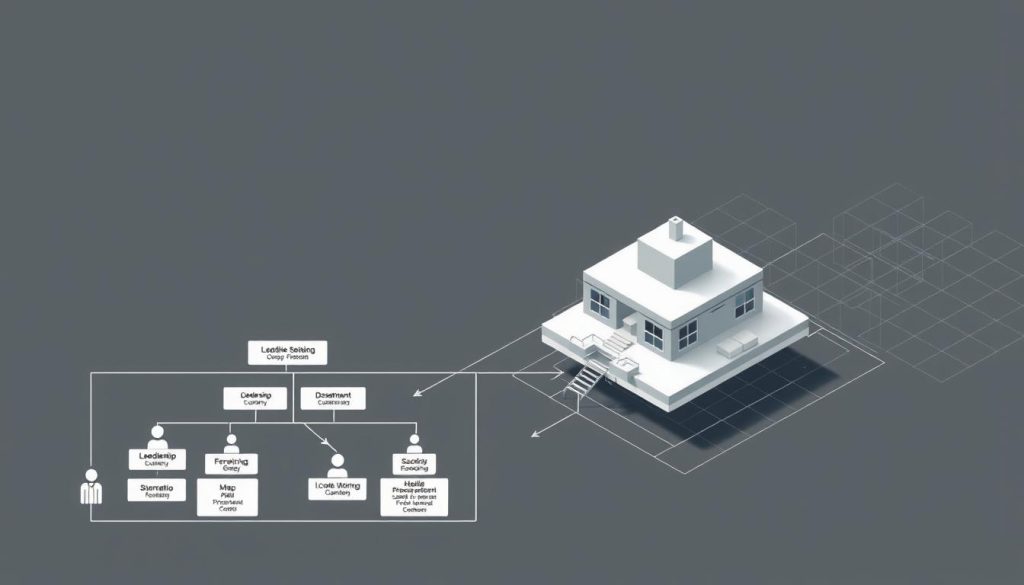Starting a business in Belgium means picking the right structure is key. Knowing the different business structures in Belgium is vital. It affects legal liability and taxes. In this guide, we’ll look at the various business types in Belgium. This will help us understand the legal and tax aspects better.
Understanding Business Structures in Belgium
A business structure is the legal setup of our business. It outlines how we manage it, handle taxes, and deal with legal issues. Knowing about business structures is key for starting a new business. It helps us make choices that fit our goals.
What is a Business Structure?
A business structure is how a business is set up legally. It shows how it’s run and how profits are shared. Structures like sole proprietorships, partnerships, or corporations have different rules for liability and taxes. Knowing the rules in Belgium helps us follow them and benefit from our choice.
Importance of Choosing the Right Structure
Choosing the right business structure is critical for our business’s success. The right one can offer tax benefits and easier funding access. But, the wrong one can cause legal problems and extra costs. So, it’s important to understand our options well.
Popular Business Structures in Belgium
In Belgium, there are many business structures to choose from. Each one meets different needs and goals. The main types are sole proprietorships, partnerships, corporations, and Limited Liability Companies (LLC). Each has its own benefits and legal rules.
Sole Proprietorships
A sole proprietorship is the simplest form of business. It’s owned and run by one person. This structure is easy to start and costs little. But, the owner faces personal liability because there’s no legal separation between the business and the owner.
Partnerships
Partnerships involve two or more people sharing ownership and management. In Belgium, there are general and limited partnerships. General partnerships share profits and liabilities, while limited partnerships protect some partners from liability.
Corporations
Corporations are more complex and offer limited liability to shareholders. This means shareholders aren’t personally responsible for debts. In Belgium, corporations must follow strict rules, making them good for bigger businesses looking to grow.
Limited Liability Companies (LLC)
LLCs are a mix of sole proprietorships and corporations. They offer liability protection while being flexible. An LLC is easier to set up than a corporation but protects personal assets.

| Business Structure | Liability | Number of Owners | Complexity of Formation |
|---|---|---|---|
| Sole Proprietorship | Unlimited | 1 | Low |
| Partnership | Unlimited (General), Limited (Limited) | 2 or more | Medium |
| Corporation | Limited | Multiple | High |
| LLC | Limited | 1 or more | Medium |
Sole Proprietorships: Pros and Cons
Sole proprietorships are the simplest business structure in Belgium. They are easy to start, which attracts many entrepreneurs. It’s important to know the good and bad sides before choosing this option.
Advantages of Sole Proprietorships
One big plus of sole proprietorships is how easy they are to start. You don’t need much paperwork, making it open to many. You also get to make decisions fast because you’re in full control.
Another benefit is the tax side. Your profits are taxed as your personal income. This can mean you pay less in taxes.
Disadvantages to Consider
But, there are downsides to sole proprietorships too. The biggest issue is unlimited liability. This means your personal stuff could be taken if the business owes money.
Also, getting money for your business can be hard. You might have to use your own savings or borrow money. These points show the pros and cons sole proprietorship Belgium to think about carefully.
| Advantages | Disadvantages |
|---|---|
| Easy to establish | Unlimited liability |
| Complete control of business | Difficulties in raising capital |
| Taxed as personal income | Limited growth |
Partnerships: Types and Features
In Belgium, partnerships offer flexible business structures for different needs. It’s key to know the types of partnerships available. We’ll look at general and limited partnerships, highlighting their unique features.
General Partnerships
A general partnership involves two or more people agreeing to run a business together. Each partner has equal say and is responsible for the business’s debts. This setup allows for shared management, combining different skills.
While it encourages teamwork, partners must remember their personal assets could be at risk. This is because they share liability for the business’s financial issues.
Limited Partnerships
A limited partnership has at least one general partner and one or more limited partners. The general partner handles the business and takes full liability. Limited partners invest capital but only risk what they’ve put in.
This setup is attractive to investors wanting a business stake without high risk. It allows for diverse input while protecting less involved investors.
Choosing the Right Type of Partnership
Choosing between a general and limited partnership depends on several factors. Consider your desired involvement, risk tolerance, and financial input. A general partnership suits those wanting control and shared liability.
On the other hand, a limited partnership is better for those wanting to manage actively but with limited liability. Knowing your business goals helps choose the right partnership type.

Corporations: Overview and Benefits
Corporations in Belgium are a top choice for big businesses. They offer a strong structure for growth and trust. In Belgium, you’ll find Private Limited Companies (SRL) and Public Limited Companies (SA).
Types of Corporations in Belgium
Belgium has many corporate structures for different needs. Here are the two main types:
| Type of Corporation | Description | Minimum Capital Requirement |
|---|---|---|
| Private Limited Company (SRL) | A flexible corporate structure with limited liability for its shareholders, suitable for small to medium-sized businesses. | €1 |
| Public Limited Company (SA) | Ideal for larger businesses or those seeking to raise capital from the public with shared ownership. | €61,500 |
Why Choose a Corporation?
Choosing a corporate structure in Belgium has many benefits. It protects your personal assets from business debts. This makes your business more secure.
It also makes your business look more credible. This is important for getting investments and partnerships.
Tax Implications for Corporations
It’s important to know the taxes for corporations in Belgium. They have lower tax rates on profits. There are also deductions and credits that can lower taxes.
Keeping up with tax changes is key. Making the right changes can save money.
Limited Liability Companies (LLC): A Hybrid Choice
Limited Liability Companies (LLCs) are becoming popular in Belgium. They offer a mix of benefits from corporations and partnerships. This makes them a good choice for many entrepreneurs. Let’s look at what makes LLCs stand out for their flexibility and protection.
Key Features of LLCs
- Limited liability protection for owners, safeguarding personal assets from business debts.
- Flexible management structure, allowing decisions to be made by members or appointed managers.
- Taxation options, with the ability to choose between corporate taxation and personal income tax.
- Less stringent regulations compared to public corporations, making compliance more straightforward.
Advantages of Establishing an LLC
LLCs have many benefits, making them a popular choice. Here are some key advantages:
- Protection of personal assets, ensuring that owners’ liabilities are confined to their investment in the company.
- Greater operational flexibility, allowing for customisation according to the needs of the business.
- Pass-through taxation, which lets profits flow directly to owners, avoiding double taxation that larger corporations might face.
- Increased credibility with customers and suppliers, often seen as a more professional business structure.
Choosing the Best Structure for Your Business
Choosing the right business structure in Belgium is a big decision. It’s important to think about many factors. These include tax implications and how well the structure fits with our business goals.
Factors to Consider
When picking a business structure, we need to consider a few things:
- The type of business we’re in.
- How much personal risk we’re ready to take.
- The taxes we’ll have to pay and any benefits.
- The amount of paperwork each structure needs.
- How we’ll get the money we need to start.
Industry-Specific Recommendations
What structure is best can change depending on the industry. Here are some specific tips:
| Industry | Recommended Structure | Rationale |
|---|---|---|
| Retail | Limited Liability Company (LLC) | Offers personal liability protection and favourable tax treatment. |
| Consulting | Sole Proprietorship | Simple formation and management with direct taxation benefits. |
| Tech Startups | Corporation | Ideal for raising investment capital and possible growth. |
| Manufacturing | General Partnership | Good for sharing tasks and resources. |
Legal Requirements for Each Structure
Starting a business in Belgium means you need to know the legal rules. Each business type has its own rules for registering and the documents needed. Whether it’s a solo business, partnership, company, or LLC, following these rules is key for success.
Registration Process
The steps to register vary by business type. For example, solo businesses can register easily at the Crossroads Bank for Enterprises. But, companies and LLCs need to do more, like write up articles of incorporation and hold a meeting.
Required Documentation and Compliance
You’ll need to provide personal ID, proof of address, and sometimes a business plan. Companies also have to give their articles of association and financial plans. Following these rules helps your business stay legal and avoids problems.

| Business Structure | Registration Process | Required Documentation |
|---|---|---|
| Sole Proprietorship | Simple registration at the Crossroads Bank | ID, proof of address |
| Partnership | Registration with a notary | ID, partnership agreement, proof of address |
| Corporation | Formal registration involving founding meeting | ID, articles of incorporation, business plan |
| Limited Liability Company (LLC) | Notarised deed and registration | ID, articles of association, employment contracts |
Impact of Business Structure on Taxes
Choosing our business structure is key for taxes and personal safety. Knowing how it affects taxes in Belgium helps us make smart choices. We’ll look at how different setups impact our personal risk and the tax perks each offers.
How Structures Affect Personal Liability
Different business types mean different risks for our personal stuff. Sole traders risk everything if the business owes money. But, LLCs can shield our personal assets, limiting our risk to what we’ve invested.
Tax Benefits and Drawbacks
It’s important to know the tax pluses and minuses of each structure. Corporations might get lower tax rates. Sole traders pay personal income tax, which could be higher. Here’s a table showing how different structures affect taxes in Belgium:
| Business Structure | Tax Rate | Personal Liability | Tax Benefits |
|---|---|---|---|
| Sole Proprietorship | Personal income tax rate (variable) | Unlimited | No separate taxation; simple to set up |
| Partnership | Personal income tax rate (variable) | Jointly liable | |
| Corporation | Corporate tax rate (fixed) | Limited | Potential tax incentives and credits |
| LLC | Variable, based on profits | Limited | Flexibility in taxation options |
Future Considerations: Growth and Scalability
In Belgium, understanding the need for a scalable business structure is key. Businesses change with market trends, customer needs, and how they operate. We must check if our current setup is right as we grow.
Evolving Business Needs
There are several reasons to look at our business structure:
- More money or customers
- Offering new products or services
- Entering new markets
- Using new strategies or technology
These changes in business growth in Belgium mean we need to think about our structure. Not changing might slow us down and miss out on chances.
When to Change Your Business Structure
Knowing when to change is important. We should think about it when:
- Our operations are not efficient
- We face legal problems because of our structure
- We need more money
- Our management needs a shake-up
At these times, talking to experts and looking at different structures can help. This way, we can grow better and stay successful.

Seeking Professional Advice and Resources
Starting a business in Belgium means we need expert advice. This advice helps us understand business structures and legal rules. The right legal help is key to our success, guiding us to make smart choices.
Importance of Consulting Legal Experts
Legal experts give us deep insights into the Belgian business world. They explain local laws, the costs of different business types, and how to follow Belgian rules. Without their advice, we might miss important details, leading to big problems later.
Resources for Entrepreneurs in Belgium
Belgium has many resources for entrepreneurs. There are government agencies, industry groups, and local chambers of commerce. These offer tools and info we need to run our businesses well.
Using these resources helps us understand the market better. It also connects us with other business people. We can join workshops, seminars, and networking events. These focus on the best ways to do business in Belgium.
Summary and Final Thoughts
Understanding the different business structures in Belgium is key to our success. Each structure, from sole proprietorships to corporations, has its own benefits and challenges. These can greatly affect how we operate and our tax duties.
Choosing the right structure is vital. We must consider factors like liability, taxes, and growth. This helps us make informed decisions.
It’s important to make decisions based on solid information. By looking at the pros and cons of each option, we can tailor our choices to our needs. Knowing the implications of each structure helps us build a secure and prosperous future.
As we move forward, let’s keep learning and adapting. The business world is always changing. Being flexible helps us handle any new developments.
In conclusion, we should make our business decisions with confidence. We have the knowledge to navigate Belgium’s dynamic market successfully.







